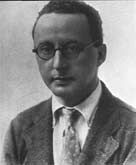Born January 27, 1885 - New York
Died November 11, 1945 - New York
 Jerome Kern was born in 1885 in New York, to a first
generation Jewish-German family. Although his mother recognised his talent
and encouraged him in music from an early age, his father insisted that
no son of his would ever pursue such a disreputable career as composing.
He insisted the 16-year-old join him in his retail business. There an
obedient Jerome might have remained, had he not spectacularly flunked
one of his first tasks - the purchase of two pianos from a factory for
the store. Over a long and drunken lunch with the factory owner, he somehow
managed to sign an order for 200! In later years, Kern often dined out
on this story: "You've, no idea what that many pianos coming off a truck
look like!" he quipped. His long-suffering father agreed that Jerome was
probably not cut out for the business world. Consequently, he was allowed
to study at the New York College of Music. He then worked as a song-plugger
and in-house composer for a New York publisher. It was in London, however,
that Kern managed to obtain his first real theatrical training. Jerome Kern was born in 1885 in New York, to a first
generation Jewish-German family. Although his mother recognised his talent
and encouraged him in music from an early age, his father insisted that
no son of his would ever pursue such a disreputable career as composing.
He insisted the 16-year-old join him in his retail business. There an
obedient Jerome might have remained, had he not spectacularly flunked
one of his first tasks - the purchase of two pianos from a factory for
the store. Over a long and drunken lunch with the factory owner, he somehow
managed to sign an order for 200! In later years, Kern often dined out
on this story: "You've, no idea what that many pianos coming off a truck
look like!" he quipped. His long-suffering father agreed that Jerome was
probably not cut out for the business world. Consequently, he was allowed
to study at the New York College of Music. He then worked as a song-plugger
and in-house composer for a New York publisher. It was in London, however,
that Kern managed to obtain his first real theatrical training.
The West End Calls
At the turn of the century, everything important that happened in the
musical theatre took place in London. So the 19-year-old Kern decided
to cross the Atlantic - aiming to learn all he could about musical comedy
and European operetta. He soon succeeded in having his own songs used
in West End shows. England became a turning point in Jerome Kern's life
for another reason: it was there he met his wife Eva, whom he married
in 1910. They stayed together for the rest his life.
On Broadway
After several years of writing songs which enhanced the scores of European
musical imports, Kern joined forces with an Englishman, Guy Bolton. Later,
he also worked - albeit briefly - with P G Wodehouse, author of the famous Jeeves and Wooster stories. With both these collaborators, Kern
wrote entirely new shows for the Broadway stage. Instead of the royalty,
clowns and gods of the European writing tradition, the three men wrote
about believable people. They also turned to modern American life (especially
new dance crazes) for their inspiration. Their shows included Very
Good Eddie, Oh Boy! and Oh, Lady! Lady!! Audiences loved these
and the small Princess Theatre where they were staged became a legend.
The Broadway musical proper was beginning to evolve. With Show
Boat, which hit the New York stage in 1927, it would finally arrive.
Kern launched himself into composing for the new 'talkie' films during
the early 1930s. It was a task he faced with typical enthusiasm, even
moving to Hollywood so he might be close to the action. Of his stage productions, The Cat And The Fiddle and Roberta became the basis for
films. Another of his original film musicals, 1936's Swing Time (which featured Fred Astaire and Ginger Rogers), won Kern the first of
his two Academy Awards. The Oscar was given for his song, 'The Way You
Look Tonight'.
Back To His Roots
Despite the excitement and the glamour of working in cinema, Kern missed
Broadway. He relished the teamwork needed to work there - Hollywood's
composers were required to do little more for films than submit their
songs. Thus he was delighted when Hammerstein asked him to collaborate
on the planned 1945 revival of Show
Boat. The compliment was greater when Richard Rodgers wrote saying
he, too, would be honoured if Kern accepted. Kern felt the younger man
had usurped his role as Oscar Hammerstein's collaborator; not unnaturally,
he was jealous of the partners' recent success with Oklahoma! (1943). He himself had not worked with Hammerstein for some time.
Their last great successes were Sweet Adeline (1929) and, three
years later, Music In The Air.
Sadly, Kern never saw his revival performed. He died of a heart attack
on 11 November, 1945 - with Oscar Hammerstein in attendance at his bedside.
At his friend's memorial service, Hammerstein remarked: 'He stimulated
everyone. He annoyed some. He never bored anyone at any time.' |